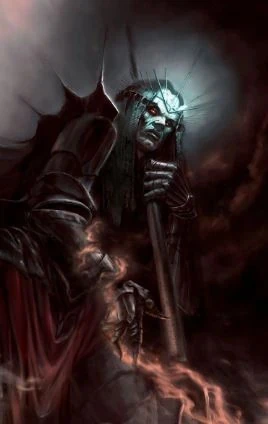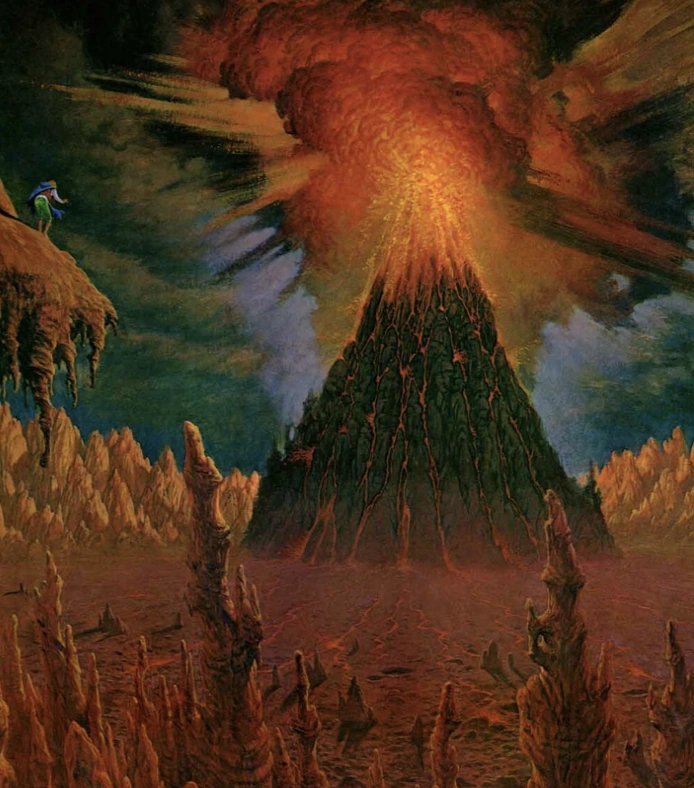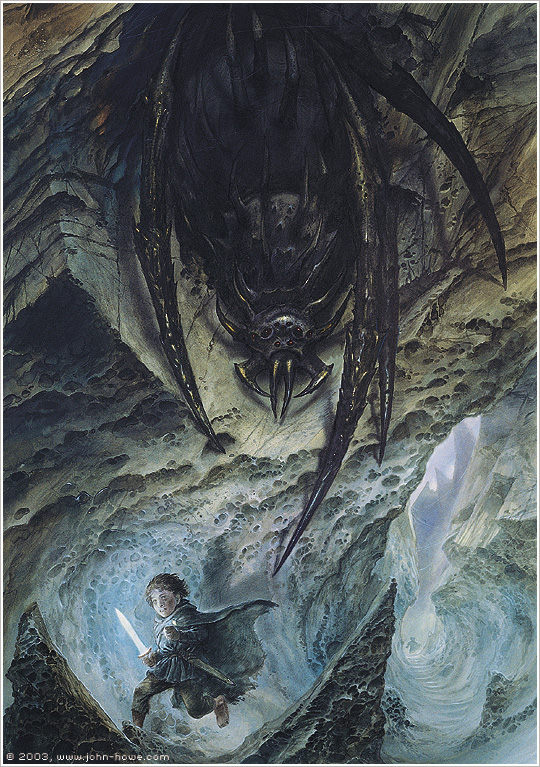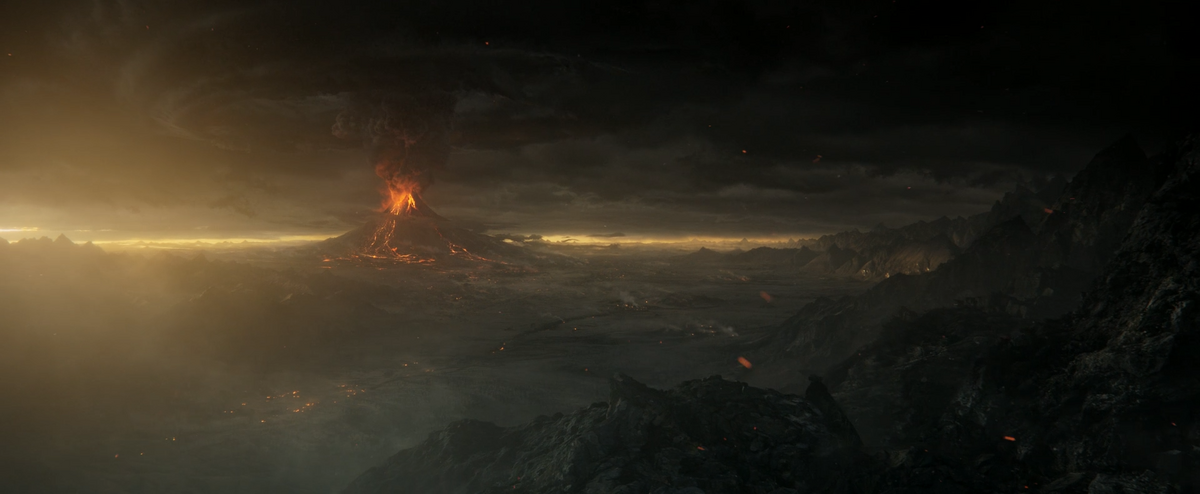ctg
weaver of the unseen
- Joined
- Aug 21, 2007
- Messages
- 9,829
Years of the LampsI'm not doubting you. I'm just interested.
Where is this stated?
After Melkor's departure, the Valar managed to quiet the tumults of the world, and set about ordering it in preparation for the coming of the Elves. To give light to the world, they constructed two Great Lamps in Middle-earth and set their place of dwelling in the midst of them. During this time, Melkor re-entered Arda with the various Maiar spirits who had attuned themselves to his music, and delved a mighty fortress at the very north-most part of the World and named it Utumno.[3] To defend it he raised the Iron Mountains as a ring around the north. Decay arose in the North, and the Valar thus knew that Melkor had returned. Before they could begin to search for him however, Melkor came forth from Utumno with sudden war, and cast down the Lamps. The fire within the Lamps scorched a great portion of the world, and containing the catastrophe caused by their breaking kept the Valar occupied long enough for Melkor and his forces to retreat back to Utumno.
After the destruction of the Lamps, the Valar withdrew to the continent of Aman and there built Valinor. In doing so, however, they gave Melkor virtually free-reign in Middle-earth. As a result, the continent languished in darkness, and Melkor filled its lands with terrible creatures and decay. During this time, Melkor built his second, lesser fortress of Angband in the west, as a defense in the West should the Valar attack. Angband was delved into the Iron Mountains, and was given to Sauron to command.[4] While the Valar were unsure where the Children of Ilúvatar would awake, they were reluctant to wage war against Melkor, fearing the clash of powers might result in massive collateral damage the likes of which they had not seen since the Lamps were destroyed. As such, most of them remained in Aman and forsook Middle-earth. Due to this, Melkor discovered the Elves before the other Valar, captured many of them, and transformed them by torture and other foul craft into the first Orcs in mockery of the Elves.

Morgoth
"I am the Elder King: Melkor, first and mightiest of the Valar, who was before the world, and made it. The shadow of my purpose lies upon Arda, and all that is in it bends slowly and surely to my will. But upon all whom you love my thought shall weigh as a cloud of Doom, and it shall bring them...
Mount Doom
The Mount Doom was created by the first dark lord Melkor during the First Age.[1] During the Second Age, Sauron chose the land of Mordor as his dwelling-place. He used the fire that welled there from the heart of the earth in his sorceries and his forging. Around SA 1600, Sauron forged the One Ring in the depths of the Cracks of Doom, which was built within Mount Doom itself. In SA 3429, Mount Doom erupted, signaling Sauron's attack on Gondor, where it earned its name "Amon Amarth."[2][3][4]
After the War of the Last Alliance and Sauron's disappearance, it was dormant and only sprung into life in TA 2954 after Sauron's return to Mordor.

Mount Doom
Mount Doom, also known as Orodruin and Amon Amarth, was a volcano in Mordor where the One Ring was forged by the Dark Lord Sauron, and accordingly the only place in which it could be destroyed. It was the ultimate destination of Frodo Baggins and Samwise Gamgee in the Quest of the Ring at the...
Shelob's early history is completely unknown, save for the assumption that she was born in the Ered Gorgoroth and that she was the "last child" of Ungoliant. By the Second Age, she often feasted on her own children, and that at some point after fleeing from Beleriand, yet long before Sauron took the land of Mordor for himself she spun a dark lair in the Ephel Dúath (Mountains of Shadow) in Cirith Ungol. For thousands of years she resided there, making a labyrinth of webs within a network of caves to better trap her prey, which included all creatures great and small. She feasted primarily on those who wandered into her webs, though if a particularly juicy morsel was available, she would silently pursue and kill it.

Shelob
There agelong she had dwelt, an evil thing in spider-form, even such as once of old had lived in the Land of the Elves in the West that is now under the Sea, such as Beren fought in the Mountains of Terror in Doriath, and so came to Lúthien upon the green sward amid the hemlocks in the moonlight...
Shelob was there before Sauron. I missed the parts where Mount Doom went dormant. So 6000 years of activity isn't right. Melkor/Morgoth is much more complicated, but he had a big part of shaping the Middle-Earth and causing the darkness. So, Mordor has been there forever and this is what OneRing has to say about the origins.
In The Atlas of Middle-earth, Karen Wynn Fonstad assumes that the lands of Mordor and Khand lay where the inland Sea of Helcar had been, and that the Sea of Rhûn and Sea of Núrnen were its remnants. In particular, she suggested that the uplift of the Plateau of Gorgoroth was closely related to the formation of Mount Doom and that the Ephel Dúath formed as a result of a tectonic uplift caused by the cataclysms of the War of Wrath.[2][3] However, in The Peoples of Middle-earth, the 12th volume of The History of Middle-earth, that was published after the Atlas, is stated that at least Mount Doom was created by Morgoth during the First Age, so before the draining of the Sea of Helcar. Also the name Mordor was given already before Sauron settled there

Mordor
Mordor was a black, volcanic plain in the southeast of Middle-earth to the east of Gondor, Ithilien, and the great river Anduin. Mordor was chosen by Sauron as his realm because of the mountain ranges surrounding it on three sides, creating a natural fortress against his enemies preventing them...
Both scientific and fantasy based conclusions are at above.

